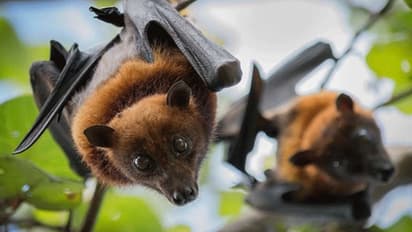South Asian scientists and conservationists bust myths about bats and COVID-19

Synopsis
The exact origin of SARS-CoV-2 or its precursor is not known. It is premature and unfair to blame bats or any other animal for the pandemic, said scientists and researchers.
Bengaluru: The world is currently battling a pandemic of an unprecedented magnitude. As scientists are struggling to trace the origin of the virus that jumped from animals to human beings, several factions of the media have already convicted bats of spreading COVID-19.
What followed is a surge of requests from people demanding the killing or removal of the winged mammals from their neighbourhoods.
Responding to this ecological crisis, a collective of bat researchers and conservationists from South Asia have come together to debunk the widely prevalent fear of bats and their link to COVID-19.
In a seven-point press release, 64 chiropterologists from 6 South Asian countries firmly clarify that bats do not spread COVID-19. The group argues that the exact origin of SARSCoV-2 (the novel coronavirus that causes COVID-19) is not known. Moreover, it diverged from the closest coronavirus found in bats called RaTG13, 40-70 years ago indicating that the bat virus cannot directly infect humans.
A recent study by the Indian Council of Medical Research (ICMR) found bat coronaviruses (BtCoV) in two species of Indian bats. The group elucidates that there is no cause for panic as these BtCoVs are not the same as SARS-CoV-2 and cannot cause COVID-19. The faeces of bats also do not pose a risk of spreading coronaviruses to humans. If bats are not complicit in spreading viruses then what led to the current pandemic?
Also read: ICMR study detects presence of coronaviruses in two Indian bat species
“Human activities and encroaching upon wildlife habitats put us at risk of encountering new viruses. These viruses may come from any wildlife species and not necessarily just bats. Thus, we need to modify human practices to prevent the emergence of new pathogens,” said Dr Arinjay Banerjee, a postdoctoral researcher at McMaster University, Canada, who studies bat viruses and was part of the team that isolated the COVID-19 virus.
Changing human-wildlife interface, global wildlife trade and industrial livestock farming are all suspects in causing zoonotic disease outbreaks in the current scenario and in past epidemics.
The collective also bats in support of bats saying that they pollinate the flowers of plants of economic value, also mangroves that form a strong coastal shield. Insect-eating bats eat pest insects in agro economic plantations and mosquitoes, thereby contributing to the region’s food security and our own health.
Unfortunately, the importance of bats has not been given due recognition by law. “Over 110 species of bats in India are unprotected, including the critically-endangered Kolar leaf-nosed bat. It is high time that the Indian government accord protection to these species,” said Rajesh Puttaswamaiah, who heads Bat Conservation India Trust.
Check the Breaking News Today and Latest News from across India and around the world. Stay updated with the latest World News and global developments from politics to economy and current affairs. Get in-depth coverage of China News, Europe News, Pakistan News, and South Asia News, along with top headlines from the UK and US. Follow expert analysis, international trends, and breaking updates from around the globe. Download the Asianet News Official App from the Android Play Store and iPhone App Store for accurate and timely news updates anytime, anywhere.